
Drugstore reading glasses are actually fine
Despite what you may have heard, a little magnifying action—courtesy of your corner pharmacy—can be a good thing. “Many patients come to me panicked because someone told them over-the-counter readers are bad for their eyes and can cause damage, but this is completely untrue,” says Inna Ozerov, MD, ophthalmologist and director of the Miami Eye Institute. “If you’re fortunate enough to have good distance vision but have trouble reading, inexpensive magnifiers are a perfectly acceptable and practical choice. The strength of the magnifiers needed is age-dependent.”
(Related: 5 Reasons You Always Have Watery Eyes)
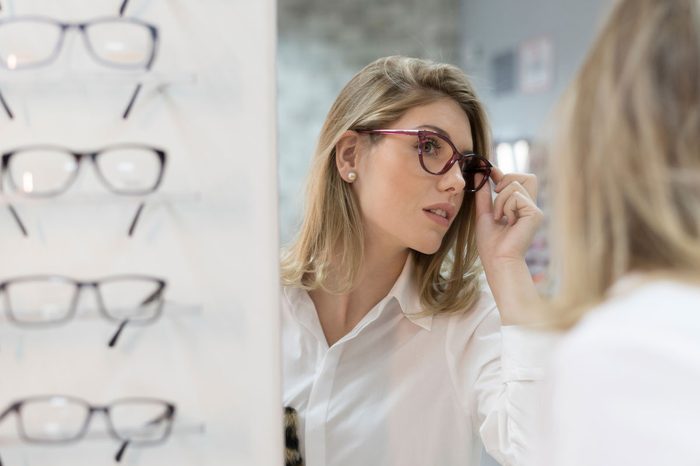
You’re going to need glasses at some point
Even if you enjoy 20/20 vision for first half of your life, at some point you will start squinting at your phone and asking your children to read you the menu at restaurants. There’s even a name for mid-life vision loss—presbyopia, which the National Eye Institute defines as the inability to focus up close. “When you start feeling the need to elongate your arms to see fine print (around age 40), it’s time to purchase a pair of reading glasses,” Dr. Ozerov says. It’s a bit counter-intuitive, but the stronger the magnification, the closer you need to hold your books.” If your vision deteriorates in the other direction in middle age—you can still read texts but now road signs are like hieroglyphics—you’ve become nearsighted and drugstore glasses won’t help you. Head to an eye doctor instead for prescription lenses.
(At your computer all day? Here’s what you need to know to reduce your risk of digital eye strain.)
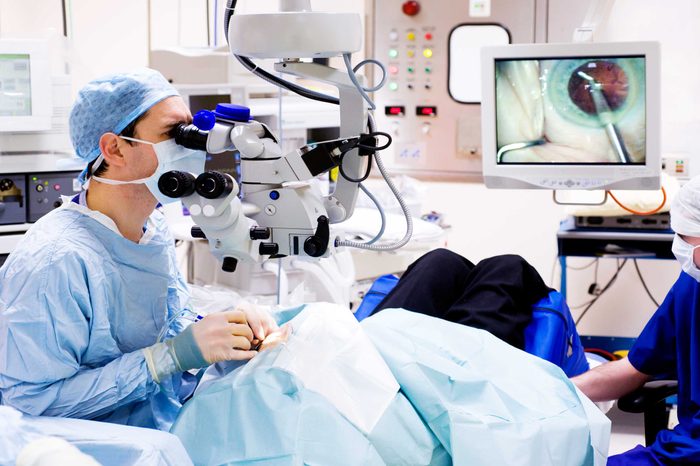
Some people may stop needing glasses temporarily
There’s a surprising phenomenon called “second sight.” “Older patients who develop cataracts may enjoy a honeymoon period where they don’t need to wear reading glasses,” Dr. Ozerov says. “This is because as the natural lens thickens, it makes the eye more myopic (nearsighted), which allows the person to be able to see smaller print without glasses. But only on a short-term basis. As the cataract matures, the overall quality of vision diminishes and ultimately cataract surgery is required.”
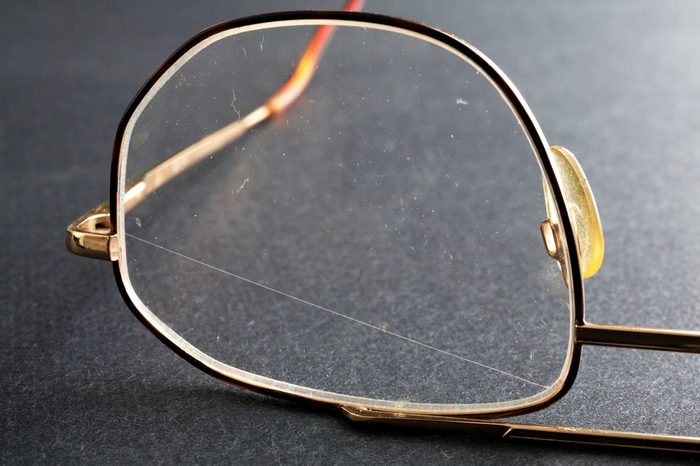
Scratches are a deal-breaker
Sure you can still see out through scratched lenses, but straining to see through the scratchy haze can tire out your eyes, Dr. Ozerov says. Fingerprints can be buffed out but scratches can’t, so the only solution is a new pair of lenses, and then it’s a good idea to give them some TLC. “To prevent scratches, don’t place your glasses with the lenses facing down,” Dr. Oserov advises.
(Related: Check out the foods that can help improve your eyesight naturally.)

New lenses belong in new frames
In your zeal to reduce costs—or because you’re still in love with your existing frames, you may want to simply replace the lenses rather than buy a new pair of glasses. Bad idea. “You cannot put new lenses in old frames because of the way the lenses are cut and secured within the frame,” Dr. Ozerov says. The frames need to be heated to remove the old lenses and then reheated to insert the new lenses, which can stress the plastic and increase the likelihood that it will split, crack, or break over time: It’s best to spring for a new pair.
(Related: Do blue light glasses work?)

Eyeglasses aren’t actually glass
Early eyeglasses were made of actual glass, but now they’re made of plastic because glass is too fragile a material for everyday use. Using glass can also be dangerous if broken—no one wants tiny glass shards near the eye—so plastic is the preferred lens material for most eyeglasses.

Buying online can cost two-thirds less
Brick-and-mortar glasses shops tend to charge more for frames because their operating costs are higher, so you may be tempted to buy glasses online, especially because the price can be much less. Aside from the issue of whether or not you’re buying designer knock-offs (check for positive or negative feedback before clicking “buy”), the bigger question is whether buying glasses on the cheap side makes sense for your prescription. “For fairly simple prescriptions, it’s fine to get them online and save money,” Dr. Ozerov says. “For more complex prescriptions, such as bifocals and especially progressive lenses, I think it’s best to go to an optometrist and be properly measured.” Be aware that many lenses automatically come with anti-glare coating, which could trigger a significant up-charge. Make sure to ask about it, whether you shop online or at a local store.
(Related: What to know before buying contacts online.)
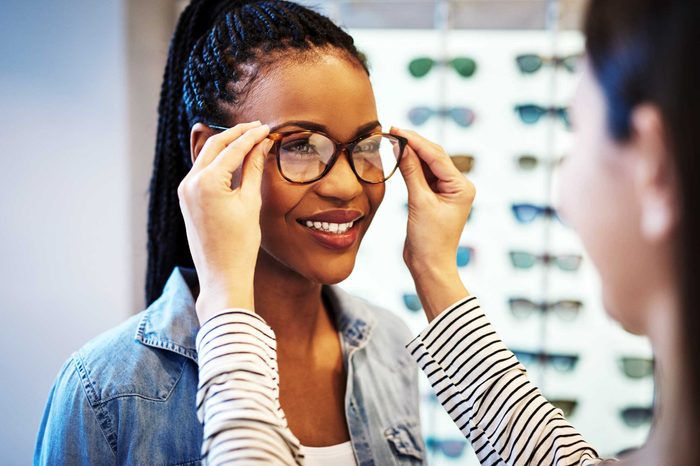
Some extras are worth it
UV rays, glare, eye fatigue, and harmful blue light are challenges our eyes face daily, but there are lenses that protect against them without the need for sunglasses. For example, Transitions lenses continuously adapt to changing light, helping protect your eyes from all three challenges. They block 100 percent of the sun’s UVA/UVB rays and reduce harsh glare. The lenses also filter harmful blue light from cell phones, laptops, and LED and fluorescent lights. Tim Gunn, the style guru formerly on Project Runway, is “wowed” by the lenses, which he adds to all his pairs of glasses. “The transition is seamless—and I know I’m protected,” he says. He particularly appreciates avoiding the nuisance of switching to sunglasses every time he heads outdoors. Transitions offers several types of lenses, including ones specifically for driving and for extreme outdoor activities.
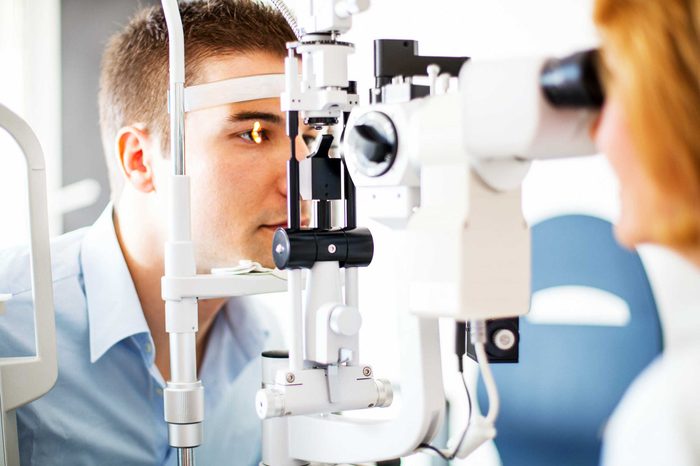
Your prescription could change in a matter of months
You may get your eyes checked every few years, when the world starts getting a little blurrier than usual, but your vision could change significantly in the interim. “Many conditions can affect the longevity of your prescription,” Dr. Ozerov says. “Conditions such as cataracts, diabetes, and glaucoma may cause changes in your prescription.” To be safe, see your eye doctor once a year to check that your prescription is suiting your vision needs.
Now that you know the best tips for wearing glasses, learn what your eyes can reveal about your overall health.
